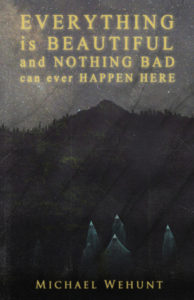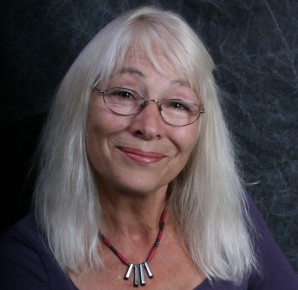REVIEW:- Everything is beautiful and Nothing Bad can ever Happen Here, a novella by Michael Wehunt.

The subject-matter of the novella, ‘Everything is Beautiful and Nothing Bad can ever Happen Here,’ written elegantly and with perception by Michael Wehunt, is not something many writers would attempt to engage with these days. The story centres around Bea Holcombe, a quietly-spoken Christian woman living in the small town of Fontaine Falls, who embarks upon a terrible journey of discovery, assisted by a band of gruesome, yet somehow pathetic phantoms. What Bea finds out, leaves her conflicted as the horrors she can both physically see and those she comes to understand, unfold before her.
The crucial scenes take place on the other side of the fence dividing the Holcombe property from the next-door neighbour, and Bea, in her quest to understand, is frequently drawn to that fence. As a consequence, she comes to grasp the reality of what one aspect of the small and pleasant town is really like, and she is compelled to look closely at the lives of those around her, and in the end, at her very own. As the darkness in Fontaine Falls is revealed, she attempts to do the right thing, but seems scarcely to know what that really is, and in that context, the phrase, ‘I’m sure she’s here as part of the concerned community,’ stands out vividly from the page.
A final shock awaits her, and what is revealed is something she tries in vain to fight against. At the same time, she must accept the idea that she is also complicit in the darkness, and she hopes that her children’s eyes will be ‘… open and looking at the world.’ The ending to this grim, yet rather tender and sad tale — while many readers might wish it had been different— is brave in its attempt at realism.
WRITING THE CHILD CEPHALINA DIARY ENTRIES.
This is my last entry for the journal I kept over the time in 2017 that I was writing the first draft of this novel which I am hoping will be published by the end of this year.
April 22nd 2017
Huzzah! I finished the first draft of the novel this morning. I wrote the horrific scene in a rush, but it was a rush of feeling, and I didn’t read it back again. Sometimes, I find, in fact quite often in writing this kind of material, that it’s best not to edit the first writing of those chilling moments because they have a jagged freshness and spontaneity about them, the style of which itself lends horror to scene. I do have a second ending in mind, if it looks to be necessary in a further draft, but where I ended it today was my first choice of ending. Now I can read, research stuff that I should know, not do anymore writing for a while and remember that the rest of the world exists.




